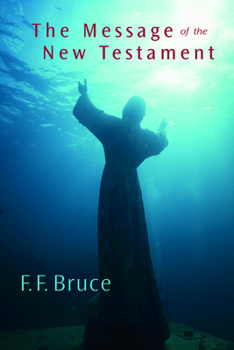The Message of the New Testament
Select Format
Select Condition 
Book Overview
For nearly 2,000 years the New Testament has been loved, hated, treasured, criticized, believed, derided, read and studied, sometimes even died for. Few believers would ever question its importance as the authoritative documentary basis for the Christian faith. Yet the message of the New Testament has not always been clearly understood, even by those who have read and reread it. In this book -- now a modern classic -- the most respected evangelical...
Format:Paperback
Language:English
ISBN:0802815251
ISBN13:9780802815255
Release Date:April 1973
Publisher:William B. Eerdmans Publishing Company
Length:120 Pages
Weight:0.44 lbs.
Dimensions:0.3" x 6.0" x 9.0"
Customer Reviews
4 ratings
The Theme
Published by Thriftbooks.com User , 14 years ago
Dr. F.F. Bruce did a good job in this synopsis of the New Testament. He concentrated on bringing out what each writer of the New Testament books distinctively wrote to bring together the main theme of this second half of the Bible. The Topics he starts with is Mark; Jesus the Son of God, Pauline letters; its God who justifies, Eternal purpose, Matthew; Jesus the Teacher, Victory in Revelation, The Word became flesh; John etc. Ultimately as we know the main theme as with the whole Bible is "Jesus Christ" and Faith in Him, He's Lord, Savior and many other titles. Read this book it is simple and very good to ponder upon.
The Theme
Published by Thriftbooks.com User , 14 years ago
Dr. F.F. Bruce did a good job in this synopsis of the New Testament. He concentrated on divulging what each writer of the New Testament books distinctively wrote to bring together the main theme of this second half of the Bible. The Topics he starts with is Mark; Jesus the Son of God, Pauline letters; its God who justifies, Eternal purpose, Matthew; Jesus the Teacher, Victory in Revelation, The Word became flesh; John etc. Ultimately as we know the main theme as with the whole Bible is "Jesus Christ" and Faith in Him, He's Lord, Savior and many other titles. Read this book it is simple and very good to ponder upon.
Case Law versus Christian Freedom
Published by Thriftbooks.com User , 15 years ago
'Paul's insistence that salvation was to be had by faith in Christ and not by law-keeping was in line with the precedent that antedated the promulgation of Moses' law. Abraham 'believed God, and it was reckoned to him as righteousness' (Gen 15:6); those who, like Abraham, believe God are Abraham's spiritual children and share in the blessing divinely associated with him and his offspring. The same principle of justifying faith recurs in the prophets: 'he who through faith is righteous shall live.' (Hab 2:4) The age of the law was in fact a temporary dispensation. If the new age is the age of the Messiah, who now reigns from the place of exaltation to which God has raised Him, it is also the age of the Spirit, who has come to dwell within believers and enable them to call God by the same affectionate term as Jesus used: 'because you are sons, God has sent the Spirit of His Son into our hearts, crying 'Abba! Father!' Gal 4:6 p 29 FF Bruce has brought the main features of all the books in the New Testament strikingly into one small, yet erudite book. The fact that Case Law undoubtedly appealed to a certain religious temperament, was not lost on Paul, who had obviously submitted to such external rulings himself. The Christians were urged to seek this higher wisdom, to explore the hidden mysteries, but however attractive many might have found this so-called knowledge, Paul condemned it and called it 'human tradition'. (Col 2:8) 'The fruit of the Spirit is love, joy, peace, patience, kindness, goodness, faithfulness, gentleness, self-control.' (Gal 5:22) No law can legislate for such qualities as these; they grow spontaneously in those who live by the Spirit.
Refreshingly Sane and Sober
Published by Thriftbooks.com User , 24 years ago
I've been searching for a good, brief undergraduate-level textbook on the New Testament for a course in Biblical Theology. There are plenty of such textbooks for the literary and historical background of the various New Testament documents, but (at this level) precious few that devote themselves to the theological *message* of the New Testament documents.The late F.F. Bruce, a highly distinguished scholar and believing Christian, provides such a summary here. After a brief consideration of method, Professor Bruce swiftly moves on to consider the earliest written witness to the life and teachings of Jesus -- the gospel of Mark --, presses into the question of the relationship between the historical Jesus and the Apostle Paul, and expounds some of the central ideas of Pauline theology such as the two ages, justification, the cosmic Christ, and the church as the body of Christ.Taking Luke and Acts as one extended work, Bruce expounds the mission of Jesus and its continuation in the mission of the Apostles according to this historical witness. Subsequent chapters (among others) deal with the Gospel of Matthew, the strange Letter to the Hebrews, and the Gospel of John.For reasons I cannot fathom, Bruce discusses the Apocalypse two chapters *before* he discusses the Gospel of John. Yet he offers no explanation of this choice -- not even the hypothesis that the writing of the Apocalypse preceded the Gospel. This is all the stranger, since Bruce thinks both books came from the same writer, the Apostle John.The book, originally published in 1972, wears well for its age. It cannot, of course, discuss the latest fads spewed forth by the so-called "Jesus Seminar." But then, it doesn't need to. This is a work of historical description and theological summary of the Christian gospel as it was preached and taught by the earliest Christians. On this most important subject, it's refreshingly sane and sober.




